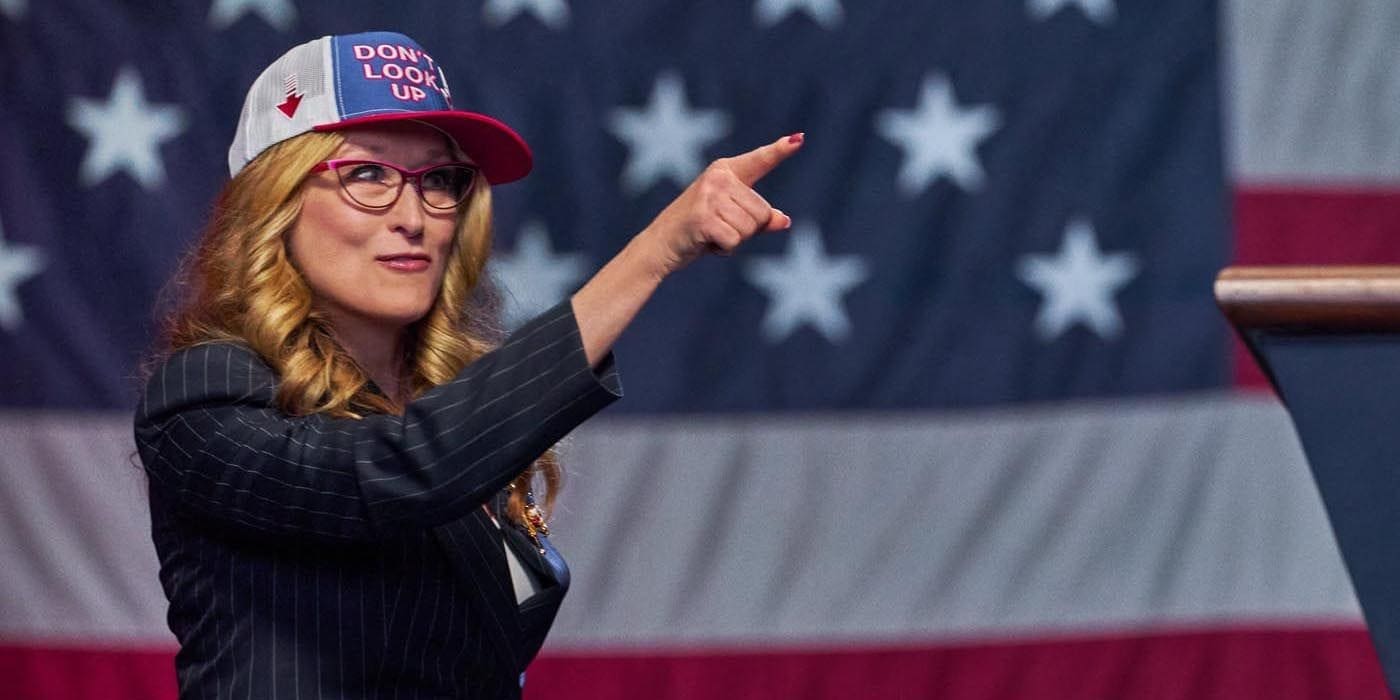Don’t Look Up has been dominating the streaming platforms for several weeks now, and not incidentally. The film is a witty, momentous, and over-the-top political satire that showcases a set of spectacular editing choices complemented by uniquely elegant scores, with never a dull moment throughout its over two hours runtime, just as expected from its Oscar-winner director Adam McKay. But whereas McKay’s previous works in the genre (The Big Short, Vice) had already incorporated these elements beautifully, Don’t Look Up took his style up a notch both in scale and scope. This had two primary consequences – one intended and one unintended – both relevant to the film’s ultimate role in shaping our collective narratives. Because it is, indeed, a highly political piece, but its message may not be the same as the creators envisioned it.
One of the consequences of this widened scope was that it became accessible to a much greater audience—one which is not necessarily interested in politics or follows it closely—by using a comically wide brush to draw up its central subject, but secondly, this artistic choice cost the director the kind of subtle nuances people close to politics loved about his earlier films. Don’t Look Up is not absent of catchy political references either, but these moments are not much of those quirky McKayian winks anymore, but blatantly obvious real-life parallels instead, which are—at times quite literally—shouting at us from the screen. This sometimes creates an uneasy feeling of watching a propaganda piece, which is untrue simply because, despite its message being spoon-fed every third minute, it is still not entirely one-sided. Or so, we want to believe just because the story is told in such an engaging way.
It is, basically, one giant allegory for climate change: its apparent (and immediate) catastrophic effects only a few are willing to admit and society’s reluctance to believe scientific experts
The plot follows two astronomers (Leonardo DiCaprio and Jennifer Lawrence) who discover a comet big enough to wipe out every life on the planet – hurtling directly towards Earth. The world has six months remaining until impact, so our heroes go on a wildly ineffective media tour trying to convince the people and the government that the threat is very real and the only option is to deter the comet with nukes while there’s still time. The US government – teamed up with the CEO of the largest tech company (which seems to be a mashup of a handful of Silicon Valley bigshots) – decides instead to blow it to pieces with elaborate but untested technology just above the planet so then they could mine its invaluably rare minerals and metals right out from the Pacific Ocean. The plan, of course, backfires, casting the world into certain doom, paying for what is essentially the unrestricted greed and hubris of the political and industrial elite. It is, basically, one giant allegory for climate change: its apparent (and immediate) catastrophic effects only a few are willing to admit and society’s reluctance to believe scientific experts, which is mostly driven by the corrupt ruling class for industrial profit through media manipulation, with constant ‘divide and conquer’ tactics deployed on the unknowing, polarized masses.
This alone would have been fine. We could stick virtually any big issue in place of climate change and it would still be mostly true, as our collective consciousness is indeed constantly shaped and reshaped by artificial media narratives driven by competing, vastly influential actors in politics and business. But McKay went further, somewhat unintentionally undermining his own brilliant thesis. The political elite depicted in the film is not just any or all administration, but a clear-cut Republican one with a heavily Trumpian populist overtone. Despite the character of President Orlean (Meryl Streep) seems to be a composite of Hillary Clinton and Sarah Palin among others, her hinted past in show business, apparent support of nepotism within the White House, and widespread use of baseball hats for political messaging make her obnoxious Trump-caricature painfully obvious.
And this one-sidedness, at least in terms of political representation, makes the film so much less than it could have been if the director were not to choose the GOP as his over-the-top cartoon villain. After all, corporate interests rule (more-or-less) every major political establishment, regardless whether they belong to the right or the left. This is true in the case of the climate change debate as well, as the billions of dollars to be made from the transition into climate-friendly energy infrastructures by certain power industry giants are non-negligible either. Nor is it hard to imagine the politicians’ stake in all this. Just as a small side note: remember when the Democratic House Speaker Nancy Pelosi’s husband bought $1.25 million worth of Tesla stocks just a month before President Biden announced that by law all new federal vehicles will be electric? And that is just one speck of dust in a global sandstorm of financial opportunities which come with the inevitable battle against fossil fuels. Pointing fingers to only one side of the spectrum feels cheap at this point, especially if you consider that in the US, both Silicon Valley and the mainstream media tends to favour the left.
Still, my greatest problem with the film was not its sometimes cartoonishly overdrawn characters and dialogues, nor the off-putting bias shown within the American party politics, and not even the slightly condescending take on the wider society’s absurd stupidity. No, for me it was the missed opportunity the subject itself presented, which would have elevated this otherwise genius satire even more, had the director taken it more seriously. Replacing the unbelievable complexity of climate change with the awfully conspicuous threat of a giant planet-killer space rock is just shallow, to put it mildly, even if that might have been necessary to make the film’s message clearer.
Climate change is not just one issue we all have to face, but an increasingly complex network of problems that sprouts new debates just by attempting to alleviate segments of it. Climate change encompasses all kinds of economic, social, cultural, and environmental challenges—tightly interwoven on a global scale—such as food security, migration, armed regional conflicts, lack of innovation, supply chain crises, unemployment, or globalized free-market issues, not to mention the competing global powers’ relative economic position to each other when it comes to trade or production deficits, which can be heavily influenced by the environmental policies they might deploy. If humanity seeks to tackle climate change, it needs to take all of these factors, and maybe hundreds more, into consideration, which is not an easy task. Sadly, it is nothing like the straightforwardness of the metaphorical comet we see in the film, otherwise, I believe, we would have already solved it.
Furthermore, putting science on one side of the scale and climate change denialism on the other is not very accurate either. Today’s actual political conundrum between western conservatives and liberals does not lie in the question of whether climate change is real or not, but in the weighing of different paths towards solving it. We all know we have to deal with it, the only difference is that some want radical changes to happen right now, while others prefer a more careful approach in order not to undermine their immediate national interests by rushed decisions (Germany’s case with its closed nuclear plants) and to protect the livelihood of millions of their citizens. The transition into our carbon-neutral paradise can only be sustainable if we don’t plunge ourselves into economic chaos, social unrest, and unprecedented poverty along the way. This—more conservative—approach is not even close to the imagined boogieman of widespread climate change denialism, and erecting strawmen to be mad at helps no one in the long run.
Nonetheless, even if the film’s political messaging is flawed, Don’t Look Up is still perfect in one important aspect, which is the depiction of the absurd nature of our polarized thinking. Whereas it fails to coherently present us through the mocking glass in our struggle to combat climate change, it does so marvellously when it comes to the numerous ideological frameworks we allowed ourselves to be confined to. In theory, these self-imposed boxes of identity politics – created by the increasingly prevalent tribal thinking throughout the West – came into being to offer solutions to the countless social, economic and cultural cleavages that run through our societies, but by now it is clear that—instead—they only deepen them.
Don’t Look Up not only does a great job showing the twisted reality of our parallel societies (one of the greatest scenes in the film is a painfully long, static shot of two American homes next to each other, where one is flying the Star-Spangled Banner while the other has the LGBT-flag with the same pride) and just how utterly incapable we are to let go these ultimately meaningless divisions even when facing the greatest existential threats, but also shows the reasons we are here in the first place. In our pursuit of meaning in a world absent of objective morality, we easily let ourselves be manipulated by the political, financial and media elites, who present us with endless streams of fake virtuous causes to pay attention to, only to divide us over some petty issues (such as transgender bathrooms) while they further their own agendas. Mass manipulation and astroturfing of our collective narratives, of course, are nothing new in cinema (another prime example would be Barry Levinson’s brilliant political satire, Wag the Dog), but Don’t Look Up combines it with a truly depressive take on how, as a result, most of our social interactions deteriorated onto the level of social media comment sections.
Even if McKay meant this film to be a wake-up call for those who do not take climate change seriously enough, for some of us the message was quite different
Therefore, even if McKay meant this film to be a wake-up call for those who do not take climate change seriously enough, for some of us the message was quite different. Don’t Look Up teaches to be more aware of what is happening around us. To turn off the news once in a while, to take a break from social media and its manufactured narratives, to learn to look beyond and see the interests that drive them. To break free from the shallow existence of being constantly manipulated. To start having meaningful conversations and participating in productive activities. To look for taking responsibility for others instead of blaming them for our shortcomings, to look for connections instead of divisions. To disconnect from the screens, to go outside and look up.
Don’t Look Up fails as a tool for leftist climate activism, but it is well worth watching despite that. It is a well-crafted, engaging, and thoroughly enjoyable work of cinema, despite all its weak points. Regardless of where we stand in relation to its political take on climate change, this film’s importance should not be downplayed as it may easily be remembered a couple of decades from now as one of the most influential period pieces of the 2020s – sad as it will be, given its depressive undertone. As for its immediate subject—the existential threat of man-made climate change—I believe that Don’t Look Up is more likely to go down in history as our generation’s Dr. Strangelove than an actual prophecy of the impending doom. It is a witty political satire mostly about ourselves, our fears and concerns, our hopes and strengths, and—a bit paradoxically—about why we should not take everything too seriously, lest we might miss the truly important things.








